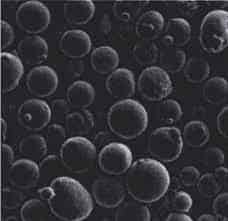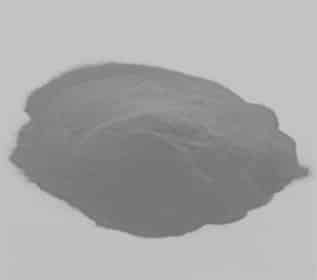Introduction: Embracing the Future of High-Wear Resistance
In the relentless pursuit of materials that can withstand extreme conditions, NiCrPSi alloys have emerged as a beacon of innovation. Their unique combination of hardness, corrosion resistance, and wear resistance has positioned them as the go-to solution for a wide range of demanding applications. This comprehensive exploration delves into the intricacies of NiCrPSi (Ni Bal., Cr 27.5-31.5, P 5.6-6.4, Si 3.8-4.2) spherical powder, unraveling its properties, applications, and the competitive advantages it offers.

What is NiCrPSi (Ni Bal., Cr 27.5-31.5, P 5.6-6.4, Si 3.8-4.2) Spherical Powder?
Understanding the Fundamentals of NiCrPSi
NiCrPSi, often referred to as nickel-chromium-phosphorus-silicon alloy, belongs to a family of self-fluxing alloys renowned for their exceptional wear and corrosion resistance. These alloys are prized for their ability to form a hard, wear-resistant surface layer during thermal spraying, a process that involves melting and propelling the powdered alloy onto a substrate. The specific composition of NiCrPSi (Ni Bal., Cr 27.5-31.5, P 5.6-6.4, Si 3.8-4.2) signifies a nickel-based alloy with carefully controlled percentages of chromium, phosphorus, and silicon. This precise formulation is crucial for achieving the desired balance of hardness, toughness, and corrosion resistance. The nickel provides the base matrix, while chromium enhances corrosion resistance and forms hard carbides. Phosphorus improves flow characteristics during application, and silicon contributes to wear resistance and high-temperature performance.
The Significance of Spherical Morphology
The spherical morphology of the powder is not merely a matter of form but a key factor that significantly elevates the material’s performance characteristics. Compared to irregularly shaped powders, spherical particles offer several advantages:
- Verbeterde doorstroombaarheid: Spherical particles exhibit superior flow characteristics, ensuring consistent and uniform feeding during processing. This consistency is crucial for achieving uniform coating thickness and properties, minimizing defects and ensuring reproducible results.
- Verbeterde verpakkingsdichtheid: The spherical shape allows for higher packing densities, leading to denser and more homogeneous coatings. This dense microstructure contributes to the material’s superior wear and corrosion resistance by reducing the potential for crack propagation and limiting the penetration of corrosive media.
- Verminderde porositeit: The close packing of spherical particles minimizes porosity in the final product, enhancing its mechanical properties and corrosion resistance. Reduced porosity not only strengthens the coating but also improves its barrier properties, making it more resistant to the ingress of corrosive agents.
Processing and Applications of NiCrPSi Powder
From Powder to Performance: Processing Techniques
The transformation of NiCrPSi (Ni Bal., Cr 27.5-31.5, P 5.6-6.4, Si 3.8-4.2) spherical powder from a raw material into a high-performance coating relies on sophisticated thermal spraying techniques. Two of the most widely used methods are:
- High-Velocity Oxy-Fuel (HVOF) Spraying: This method utilizes a high-velocity jet of oxygen and fuel to melt and propel the powder onto a substrate, creating dense and well-adhered coatings. HVOF is favored for its ability to produce coatings with low oxide content, high bond strength, and minimal heat input to the substrate, reducing the risk of distortion.
- Plasma Transferred Arc (PTA) Welding: PTA welding utilizes a plasma arc to melt both the powder and the substrate, resulting in high-quality, metallurgically bonded coatings. This method is preferred when superior bond strength and low dilution with the substrate are critical, ensuring a robust and long-lasting coating.

Diverse Applications Across Industries: Where Performance Meets Durability
The exceptional properties of NiCrPSi coatings have led to their widespread adoption in a variety of industries, each with its unique set of challenges and demands:
- Olie en gas: Downhole drilling tools, valves, pumps, and other components exposed to harsh environments benefit from the exceptional wear and corrosion resistance of NiCrPSi coatings. These coatings extend the service life of critical components operating under extreme temperatures, pressures, and corrosive fluids, reducing downtime and maintenance costs.
- Mining and Minerals Processing: Crushers, mills, chutes, and other equipment subjected to abrasive wear rely on NiCrPSi coatings to maintain their structural integrity and efficiency. The coatings protect these components from the constant impact and abrasion of hard, abrasive materials, extending their lifespan and reducing operating costs.
- Stroomopwekking: Boiler tubes, turbine blades, and other components operating at high temperatures and pressures are protected from wear, erosion, and corrosion by NiCrPSi coatings. This protection ensures the reliable operation of power plants and reduces downtime, contributing to a more stable and efficient energy grid.
- Automobiel: Engine components, exhaust systems, and other parts requiring wear and corrosion resistance utilize NiCrPSi coatings to enhance durability and performance. The coatings can withstand the high temperatures and corrosive environments found in internal combustion engines, improving fuel efficiency and reducing emissions.
Target Users and Applications:
- Maintenance and Repair: NiCrPSi coatings are ideal for repairing worn or damaged components, extending their lifespan and reducing replacement costs. This is particularly beneficial for high-value components where replacement is costly or time-consuming.
- Original Equipment Manufacturers (OEMs): Incorporating NiCrPSi coatings during manufacturing enhances the durability and performance of equipment, providing a competitive edge. This can translate into longer warranties, reduced maintenance requirements, and increased customer satisfaction.
- Industries Facing Extreme Conditions: Any industry dealing with high wear, corrosion, or extreme temperatures can benefit from the exceptional properties of NiCrPSi coatings. This includes aerospace, chemical processing, pulp and paper, and many others.
Comparative Analysis: Xmetto NiCrPSi Powder vs. Competitors
| Functie | Xmetto | Leverancier A | Leverancier B | Leverancier C |
|---|---|---|---|---|
| Leverancier | Xmetto Advanced Materials | Praxair Oppervlaktetechnologieën | Höganäs AB | Kennametal Stelliet |
| Plaats | China | VS | Zweden | VS |
| Prijsklasse (USD/kg) | $60 – $80 | $80 – $100 | $90 – $110 | $100 – $120 |
| Price per Piece (Estimate) | Contact for Quote | Contact for Quote | Contact for Quote | Contact for Quote |
| Specialties | Customized particle size distribution, High purity, Consistent quality | Wide range of alloys, Technical support | High-volume production, Fast delivery | Advanced characterization, Research & Development |
Opmerking: Prices are approximate and may vary depending on order volume, specifications, and market conditions.
Advantages and Limitations of NiCrPSi Powder
Benefits and Drawbacks: A Balanced Perspective
| Voordelen | Beperkingen |
|---|---|
| Exceptional wear resistance, significantly extending the lifespan of components subjected to abrasion, erosion, and fretting wear. | Relatively high cost compared to some alternatives, such as hard chrome plating. However, the enhanced lifespan and reduced maintenance often outweigh the initial cost difference. |
| Excellent corrosion resistance, protecting components from a wide range of corrosive media, including acids, alkalis, and salt water. | Can be challenging to machine due to its hardness, requiring specialized tooling and techniques. However, the need for machining is often minimal as the coatings are typically applied to near-net-shape components. |
| High hardness and toughness, enabling the coating to withstand both impact and abrasive wear, making it suitable for demanding applications. | May require specialized processing equipment for thermal spraying, which can be a significant investment. However, the versatility and wide range of applications for NiCrPSi coatings make it a worthwhile investment for many industries. |
| Good high-temperature performance, maintaining its properties at elevated temperatures, making it suitable for applications such as turbine blades and engine components. | Limited ductility, making it less suitable for applications requiring significant bending or deformation. However, the coatings are typically applied in thin layers, minimizing the impact on the overall ductility of the component. |
Delving Deeper: The Intricacies of Wear Resistance
The exceptional wear resistance of NiCrPSi alloys stems from a complex interplay of microstructural features and mechanisms that work synergistically to resist material removal. The presence of hard chromium carbides, formed during the thermal spraying process, within a nickel-rich matrix creates a composite-like structure that effectively resists abrasive wear. These carbides act as hard, wear-resistant particles within the tougher nickel matrix, providing a combination of hardness and toughness. Additionally, the formation of a protective oxide layer, primarily composed of chromium oxide, on the surface further enhances its resistance to corrosion and wear. This oxide layer acts as a barrier, preventing the corrosive media from reaching the underlying alloy and inhibiting further chemical attack.
Why Choose Xmetto for NiCrPSi Powder?
Xmetto Advanced Materials stands out as a premier supplier of high-performance NiCrPSi powders, committed to providing not just materials but tailored solutions that meet the specific needs of our customers. Our dedication to quality, innovation, and customer satisfaction is reflected in every aspect of our operations, making us the ideal partner for your NiCrPSi powder needs. By choosing Xmetto, you benefit from:
- Tailored Solutions: We offer a wide range of particle sizes and distributions to meet your specific application requirements, ensuring optimal coating performance. Our team works closely with you to understand your needs and provide customized solutions that deliver the best results.
- Stringent Quality Control: Our rigorous quality control measures ensure consistent powder properties and performance, providing you with reliable and high-quality materials. We adhere to strict industry standards and conduct comprehensive testing to guarantee the quality and consistency of our products.
- Concurrerende prijzen: We strive to provide competitive pricing without compromising on quality, offering you excellent value for your investment. Our efficient operations and strong supplier relationships enable us to offer competitive pricing without sacrificing quality.
- Technische expertise: Our team of experienced engineers is available to provide technical support and guidance, assisting you in selecting the right materials and optimizing your coating processes. We are committed to being a valuable resource for our customers, providing technical expertise and support to ensure their success.
FAQs: Addressing Your Key Concerns
1. What is the typical particle size range for NiCrPSi (Ni Bal., Cr 27.5-31.5, P 5.6-6.4, Si 3.8-4.2) spherical powder?
The typical particle size range is 15-150 microns, with customized options available upon request to meet specific application needs. The particle size distribution is carefully controlled to ensure optimal flowability, packing density, and coating properties.
2. What are the recommended storage conditions for NiCrPSi powder?
Store the powder in a cool, dry place, away from moisture and direct sunlight. Proper storage prevents powder degradation and ensures optimal performance during processing. It is also recommended to store the powder in tightly sealed containers to prevent oxidation.
3. Can NiCrPSi coatings be applied to a variety of substrates?
Yes, NiCrPSi coatings can be applied to a wide range of metallic substrates, including steel, stainless steel, and various alloys. The compatibility of the coating with the substrate material should be considered for optimal adhesion and performance. Proper surface preparation is crucial for achieving good adhesion, and preheating the substrate may be required depending on the specific materials and coating process.
4. What is the typical hardness of NiCrPSi coatings?
The hardness of NiCrPSi coatings can vary depending on the processing parameters, but it typically ranges from 55 to 65 HRC, providing exceptional resistance to abrasive wear. The hardness can be further influenced by factors such as the coating thickness, heat treatment, and the specific composition of the alloy.
5. Does Xmetto offer technical support for NiCrPSi powder applications?
Yes, our team of experienced engineers is available to provide technical support and guidance for your specific application needs, including material selection, process optimization, and troubleshooting. We are committed to being a valuable resource for our customers, providing technical expertise and support to ensure their success.
Conclusion: Embracing a New Era of Durability
NiCrPSi (Ni Bal., Cr 27.5-31.5, P 5.6-6.4, Si 3.8-4.2) spherical powder stands as a testament to the power of materials science in pushing the boundaries of performance. Its unique combination of properties, coupled with its versatility in processing and applications, has cemented its position as an indispensable material for industries demanding the utmost in durability and reliability. As we continue to explore the full potential of NiCrPSi alloys, we can expect to see even more innovative applications emerge, further solidifying its legacy as a material that defines the cutting edge of high-wear resistance.










